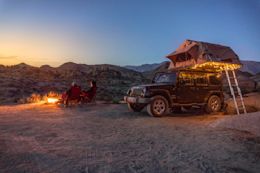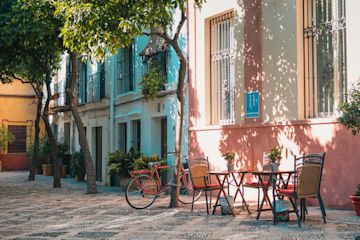
Camping: what campsites cost
Whether you prefer a camper van or pop-up tent, discover how much camping costs in Germany and what you need to know before your vacation in the great outdoors.
10 min read
Feeling a little uncertain about your 2023 summer vacation budget? You’re not the only one. Not only has the cost of living increased, but hotels, flights, and everything else are also going up. Although camping is usually more budget friendly than an all-inclusive getaway, it might still leave a hole in your pocket. But don’t worry — there are ways to make sure your camping trip doesn’t cost an arm and a leg! Read on to discover how much staying in a tent costs, what costs are associated with a camper van, and what’s cheaper overall.Maybe you’re dreaming of a lovely road trip through Germany in your camper van. Or perhaps pitching your tent and stripping things back to the bare essentials sounds magical to you. Your summer vacation can look totally different, depending on whether you want to spend your nights in a tent or a camper van. Of course, the costs vary, too. Either way, camping offers the perfect balance of relaxation and adventure. Plus, it’s a cheaper, more flexible option than package travel. Read on to discover what kind of camping trip is the best match for you and your finances. Birds twittering in the morning, crickets chirping in the evening: In a tent, you’re at one with nature and can recover from the hectic day-to-day of the big city. Whether you’re planning your summer vacation with children or you’re desperate to finally get some alone time, camping in a tent offers something for everyone. But what does a night’s accommodation in a tent actually cost?Tents and comfort are no longer mutually exclusive. See: “glamping,” a portmanteau of “glamorous” and “camping.” Luxury campsites will set you back more than €100 per night — but that’ll get you a beautiful tent, yurt, or wagon kitted out with everything you need. Plus, it’ll be tall enough for you to stand upright, and you’ll have access to exclusive amenities like spas, sophisticated restaurants, or horseback riding.A standard campsite pitch is much cheaper. A family campsite in Bavaria will cost around €29 a night, while the pitch for a two-person igloo tent on a farm in Thuringia will cost a mere €4. There might be an additional overnight fee per person (and per pet), generally a few euros per day. Don’t forget about coins for a hot shower in the morning, a load of washing, or electricity — unless you can cope without them.By the way, wild camping is totally free, but it’s banned in forests, on paths, and in front of houses. If you’re caught camping in a conservation area or protected area (“Naturschutzgebiet” in German), you’ll pay a fine of up to €5,000, depending on the federal state in question. A better option is to stay with friends or relatives who have their own land or allotment. You can keep the camping vibes going and put your tent up on their property, but enjoy some good company (and reliable access to a washroom, no less).As you can see, tent pitches can be very cheap, depending on where you go. But staying in a tent comes with lots of other perks, too:Spending your summer vacation in a tent has a few downsides, as well. From Baby Boomers to Gen Z, lots of people dream of having their own camper van and save up steadily to buy one. When you’ve got your own little house on wheels, you can head off on vacation whenever you like, or even decide to try an alternative lifestyle. But what do you pay on campsites in Germany? And what are the pros and cons of vacationing in a camper van? Let’s take a look.According to a recent study by PiNCAMP, ADAC’s camping portal, German campsites cost an average of €42.60 a night. This is relatively cheap, compared to other European countries. In Italy, Switzerland, and Croatia, for instance, it costs more than €60 to spend the night in your camper van. Still, the prices for campsites in Germany have jumped more than 40%, from around €30 a night in 2020. Lots of operators have had to raise their fees due to the increase in energy prices. There’s also been an uptick in demand, with growing numbers of people looking for alternatives to hotels and vacation homes. One way to save money is to seek out lesser-known destinations for your vacations. Instead of heading to Mecklenburg-Vorpommern, where accommodation costs an average of €48.30 a night, you could opt for Thuringia. There, a camper van pitch averages €35.10 a night. You can also stay for under €40 in Saxony-Anhalt, North Rhine-Westphalia, and Hesse. Don’t forget, though, that the place you park your camper van isn’t your only expense. There are also ancillary costs like electricity, water, and environmental fees that aren’t always included in the price. Electricity costs are calculated based on usage, for instance, with most campsites charging between 40 and 80 cents per kilowatt hour. To find out more, read our post on the costs of vacationing in a van.Like vacationing in a tent, spending your time off in a camper van gives you flexibility and the chance to relax in nature — plus a few other perks: No matter whether you want to vacation in a camper van or in a tent, either option is usually cheaper than a flight and a hotel or vacation rental. And apart from mosquitoes, luggage tetris, or noisy neighbors, a camping break is a great way to unwind. But which option is better? Tents are cheaper, it’s easier to find a spot during high season, and you can vacation with your whole family. Conversely, you’ll be more comfortable in a camper van, are protected from wind and rain, and have plenty of space to store your things. In other words, budget shouldn’t be the sole factor to consider when deciding on your 2023 summer vacation. Maybe a tent isn’t your thing or sitting behind the wheel of a massive camper van doesn’t appeal to you. If that sounds like you, a weekend break within Germany could be a good alternative. Travel is ultra-affordable thanks to the €49 public transport tickets, and your accommodation costs will be lower on a shorter trip.Craving an outdoor adventure? Camping will definitely help you scratch that itch. And with an N26 bank account, your finances will always be under control — no matter where your summer vacation takes you. Thanks to instant push notifications, biometric authentication, discreet mode, and Mastercard 3D Secure, you can enjoy secure banking on the go. And speaking of security, paying for travel, cellphone, and rental insurance is a thing of the past — a N26 Metal premium account includes all the major insurance policies so you can kick back and relax on vacation. The rain’s set in for good, or you’re struggling to find a campsite? Enjoy generous discounts with N26 partner offers from providers such as Booking.com or Rentalcars. Use our free account switching service to open your bank account in just ten minutes — without any pesky paperwork.
Going camping: tent or camper van?
Tents: costs, pros, and cons
How much staying in a tent costs
Pros of tent camping
- Flexibility: You’re already at one of Germany’s most beautiful campsites, but want a change of scenery? A tent leaves you footloose and fancy-free so you can camp somewhere different every day. Your accommodation is quick to put up and take down, and booking is generally flexible.
- Relaxation: When you’re immersed in the great outdoors, you can enjoy the fresh air, recharge, and take things at a slower pace. On a campsite, it’s even easier to leave your laptop untouched for a while — especially if electricity and WiFi cost extra. That’s good for your work/life balance and for your health.
- Community: You’ll probably meet lots of like-minded people and families when you’re camping. That’s a massive perk, especially on a summer vacation with children. Most campsites have sports facilities and leisure areas, playgrounds, and spacious lawns where little ones can let off steam. And if you need some peace and quiet, you can retreat to your campsite whenever you need.
Cons of camping in a tent
- Insects: From mosquitoes buzzing around the tent and crickets chirping until the early hours to wasps taking aim at your jam sandwich, these troublemakers come in all sorts of guises. And if you’re looking to set up your tent in Bavaria, Baden-Württemberg, or another high-risk area for tick-borne encephalitis, you should get a vaccination or booster shot against ticks.
- Bad weather: German summers often alternate between blistering heat and heavy rain, both of which can take the fun out of camping. There aren’t tons of leisure activities to do when it’s raining, and hot nights can ruin your sleep — especially if you don’t have any electricity to run a fan.
- Lots of luggage and nowhere to put it: If you want to cook for yourself, you need a camping stove, gas canisters, cookware, cutlery, and a cooler. That’s on top of clothing for all weathers, plus a tent, sleeping bag, sleeping mat, hand towels, camping stool, swimming things, and much more. If you don’t have a rental car or your own vehicle, you’ll either have to schlep tons of stuff around or pack very lightly. Don’t forget that there’s not much space in the tent for your suitcase and that there’s no protection for your valuables.
Camper van: costs, pros, and cons
The cost of camper van sites in Germany
Pros of a camper van vacation
- Comfort: From a comfy mattress to a kitchenette and a washroom, a camper van trip offers similar creature comforts to a vacation home. There might even be extra amenities, like air conditioning, a TV, or an awning area with lots of seating, depending on the specific set-up.
- Space: Camper vans are cleverly designed with lots of storage space, even if it’s not obvious at first glance. In addition to built-in cupboards on the walls, above the driver’s cab, and under the bed, there’s the back door, the exterior walls, and the roof for transporting your stuff — ideal for bikes, your surfboard, or a roof tent.
- Security: You can cozy up in your camper van on rainy days or chilly nights, or turn on the AC if you get caught in a heat wave. Thanks to rooftop solar panels and a lithium battery, you’re covered even if there��’s no electricity supply. And while your camper van might not be fully secure against break-ins, it does offer more protection for your valuables.
Cons of camper vans and similar vehicles
- Very high demand: Spiking travel costs mean lots of people are spending their 2023 summer vacation on a campsite. This makes pitches a sought-after commodity and pushes campsite prices up. It can take a while to find somewhere with space, especially if you’re heading to popular spots like the Baltic Sea or the Black Forest. You’ll have better luck during the off-season — but then you’ll have work commitments and unpredictable weather to consider.
- Limited number of people: A remodeled van usually has just two or three seats in the driver’s cab. That’s perfect for solo campers or couples, but tricky if you’re heading off on a summer vacation with children. There are larger camper vans with up to six seats (and six seatbelts). However, they easily exceed a total weight of 3.5 tons, meaning you need a class C1 driver’s license. Plus, larger models cost more, regardless if you’re renting or buying.
- Speed restrictions: Speed limits apply on certain roads and highways, depending on weight. 3.5- to 7.5-ton vehicles, for instance, can only go 80 km/h on highways. Compared to driving a car, you’ll spend more time behind the wheel while the sun’s shining outside. And even if you’re allowed to go faster, you should limit your speed to 110 km/h for better fuel efficiency — and for the sake of your wallet. Otherwise, you could easily burn through your gas budget.
Tent or camper van? Consider your budget — and follow your intuition
Find similar stories
BY N26Love your bank
Related Post
These might also interest youTRAVELWhy winter is the best season for budget travelFrom cheaper flights to luxury bargains, here’s why winter is the ultimate time to travel without breaking the bank.
4 min read
TRAVELKeeping your money safe when traveling abroadHow to secure peace of mind for you and your wallet while you’re out exploring the world.
4 min read
TRAVELHow to travel with friends without any financial stressPlanning a group trip? Here's how to handle shared holiday expenses to keep everyone happy.
5 min read


